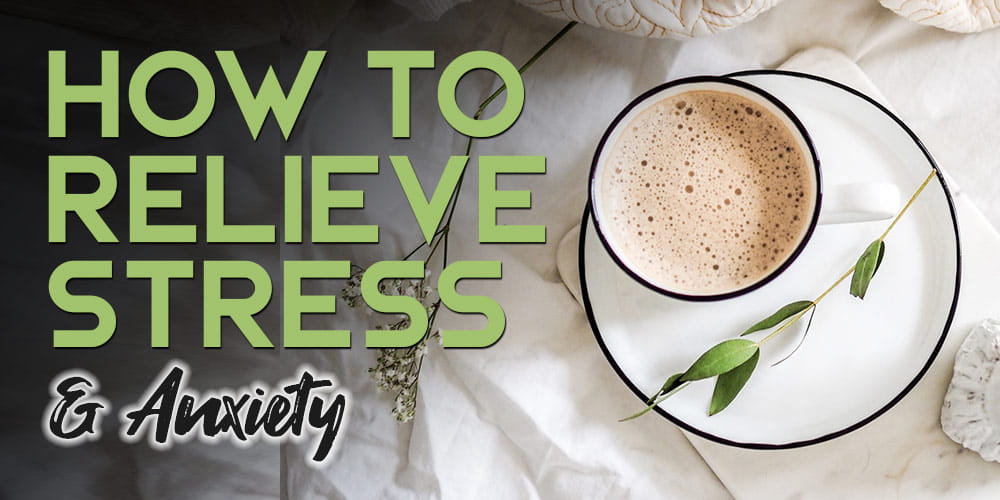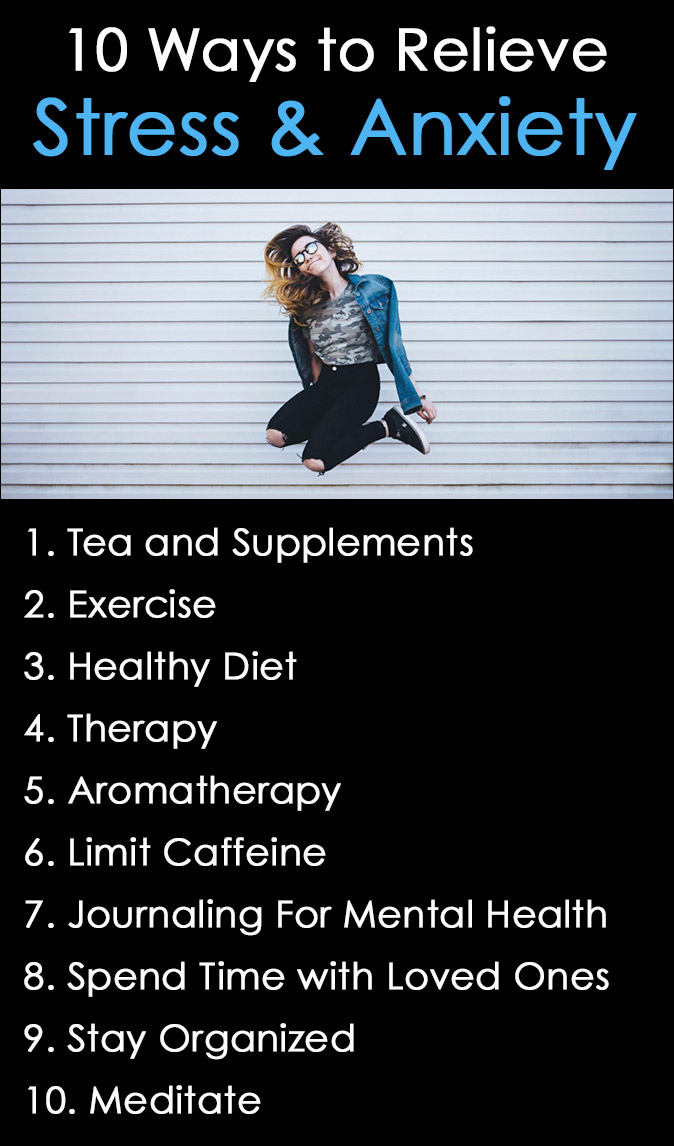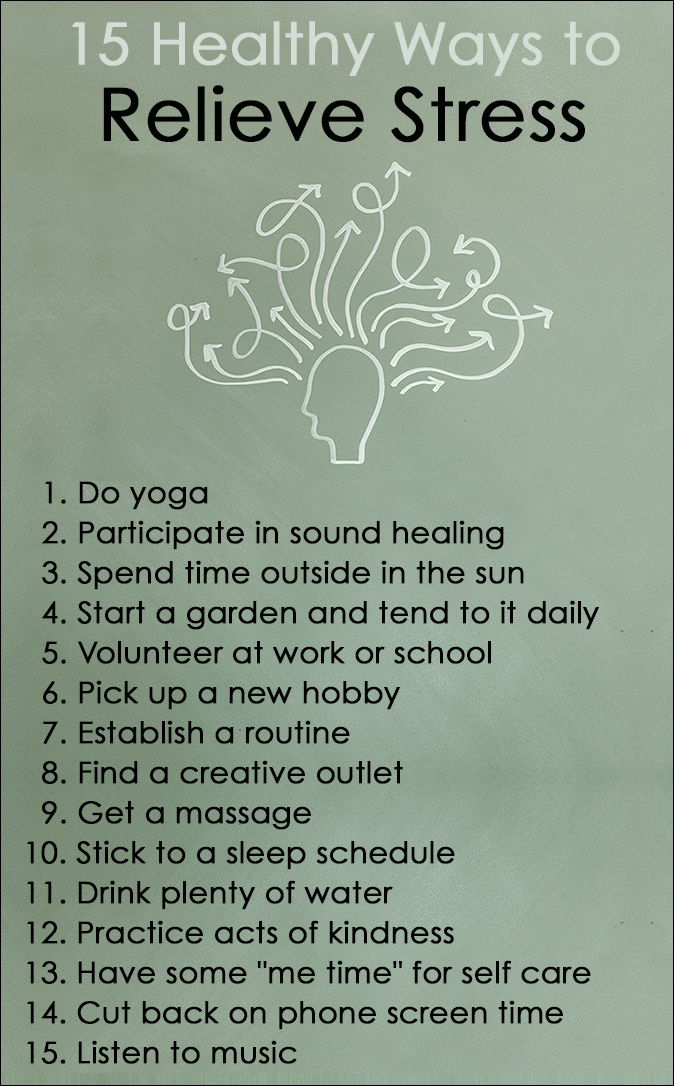
Stress is related to anxiety and can lead to depression if not addressed, so finding ways to relieve stress and anxiety can improve mental health and daily living.
As a natural human response to a difficult situation, stress can be experienced as physical or mental symptoms that trigger an increase in blood pressure, heart rate, and other bodily functions.
It was found that 77 percent of people regularly experienced physical symptoms caused by stress, and 33 percent reported living with extreme stress, according to the American Institute of Stress.
As a result of our nation’s skyrocketing stress levels, statistics from the Anxiety and Depression Association of America show anxiety disorders are now the most common mental illness in the United States, affecting 40 millions adults.
Nobody is immune to stress, and many celebrities with anxiety have come forward to talk about their issues and how treatment helped them overcome many of the symptoms.
Because stress, anxiety, and depression often go hand-in-hand, anxiety disorders are considered a serious health condition that should be treated by a professional.
In some cases, medications are necessary for managing stress and anxiety symptoms.
Whether using medications, or experiencing less severe symptoms, there are many healthy and natural ways to relieve stress and anxiety.
Incorporating these methods into a daily routine will not only help stay calm and focused, but they can also improve mood and overall mental health.
10 Natural Ways to Relieve Stress and Anxiety
1. Tea and Supplements
Did you know that drinking tea can calm a worried mind? In fact, chamomile has the power to affect the same brain receptors as the medication Valium.
Green tea is known to increase GABA and reduce a rising heart rate and combat anxiety.
Lemon Balm is available in the form of tea, capsules, or tinctures and has been used since the middle ages as a calming herb. Not only will lemon balm help promote better sleep, it will also ease the gastrointestinal tract, alleviating digestive issues related to stress and anxiety.
Another herb that can improve mood, ease anxiety, and boost energy is kava root. Kava root is a member of the pepper family and is so powerful that those taking it should not be on any other supplements or medications.
The active ingredient in kava root, kavalactones, prevent epinephrine from overwhelming the body without affecting serotonin and other neurotransmitters.
If you are currently taking medication, check with your doctor before implementing any supplements into your routine.
2. Exercise to Relieve Stress and Anxiety
Exercise is one of the most effective ways to relieve stress and anxiety. Regular exercise boosts feel-good neurotransmitters in the brain, improves self-image, and helps people sleep better.
When people are active, the brain and body increase endorphins that act as mood boosters and natural painkillers, and reduce cortisol levels, which is the body’s stress hormone.
Keep in mind that exercise doesn’t necessarily require attending hour-long boot camp classes or running a marathon. There are many forms of exercise, so make it a priority to discover a routine that works for you.
If you are interested in something less intense, start walking regularly, take a dance class, or go rock climbing. As a general rule, raising the heart rate for at least 30 minutes, a few times a week, is a great place to begin.

3. Healthy Diet
Everyone knows that too much sugar and processed foods are bad, so rather than telling people what they shouldn’t eat, it’s better to focus on what we should eat.
It’s important to eat when hungry, because anxiety and irritability are often a product of low blood sugar. Keeping a healthy snack on hand (like nuts or a protein bar) can substantially help alleviate stress related to hunger.
Eating breakfast is an effective method when it comes to managing stress and anxiety. It is essential to eat food in the morning that includes protein.
Eggs are a great way to start the day, as they are a source of protein, as well as choline, which is a nutrient that combats anxiety. They are considered one of several types of serotonin foods that increase production of the feel-good neurotransmitter.
It is also recommended to get a fair share of fatty acids. While it is possible to get fatty acids by taking omega-3 supplements, it is better to consume them naturally through diet. The best sources of fatty acids are salmon, anchovies, sardines, and mussels.
4. Therapy
While many doctors choose to prescribe medications for various types of anxiety disorders, there are also many forms of therapy that can help manage stress and anxiety with or without the use of pharmaceuticals.
For anyone seeking treatment for stress and anxiety, the following treatment methods can be helpful:
- Cognitive Behavioral Therapy (CBT)
- Dialectical Behavior Therapy (DBT)
- Neurofeedback Therapy
- Eye Movement Desensitization and Reprocessing (EMDR)
- Acceptance and Commitment Therapy (ACT)
5. Aromatherapy
Sometimes the difference between an anxiety attack and a sense of calm is quite simple. Did you know that lighting a candle has the power to shift your mood? This is called aromatherapy.
While the science behind aromatherapy is still unknown, we do know that scents have the power to bring back positive memories and interact with hormones in the blood.
To integrate aromatherapy into your routine, try an oil diffuser. Oil diffusers are the ideal way to fill your environment with relaxing scents without the additives.
Some of the most calming scents to relieve stress and anxiety include:
- Lavender
- Vetiver
- Bergamot
- Sandalwood
- Ylang ylang
- Geranium
- Orange
6. Limit Caffeine
If you are struggling with stress and anxiety, cutting back on coffee, caffeinated teas, chocolate, and energy drinks can replace the jitters with a sense of calm.
Caffeine is a stimulant that often triggers anxiety. Every person’s caffeine tolerance is different, so it’s important to be honest with yourself about whether your caffeine intake is negatively affecting your mental state.
7. Journaling For Mental Health
Sometimes stress and anxiety accumulate simply because the mind has no method of release. Writing down your worries can help work through anxious thoughts and shift your perspective.
By changing your thought pattern from worry to contemplation, you will find an action-based sense of empowerment.
Journaling for 5 to 15 minutes each day will provide the opportunity to share what is on your mind.
Write about your concerns, fears, and current difficulties. Then, write about how you could think differently about these worries. This will help to work through anxiety and relieve stress for better mental clarity.
8. Spend Time with Loved Ones
Learning how to increase oxytocin is a very effective way to relieve stress and anxiety, and connection is one of the greatest tools for accomplishing this.
Being surrounded by friends and family will increase your sense of self-worth and purpose. In fact, spending time around loved ones releases oxytocin, which is a natural stress reliever.
Another benefit of being surrounded by friends and family is that it results in laughter, which not only feels great, it is also good for mental and physical health. Laughing draws oxygen into the body and organs, reduces the stress response, and relaxes the muscles.
While human interaction is essential to our well being, time spent with animals is also a great way to manage stress and anxiety. Having a pet releases oxytocin, keeps you active, and provides a sense of purpose and companionship, which will lessen anxiety symptoms.
9. Stay Organized
There are countless benefits to living in an organized space. Most people naturally experience more calm with less stress and anxiety when their surroundings are free of clutter and personal items are easy to locate.
But staying organized is more than just having a clean house. It is also critical to maintain an organized schedule. The key to staying on top of your to-do list is to avoid procrastination.
Waiting until the last minute to work on projects almost always results in stress and anxiety when scrambling to catch up. Be sure to set aside uninterrupted time to complete all daily tasks.
Another secret to maintaining your schedule is learning how to say no. Whether it is saying no to additional work, social outings, or responsibilities, it is often within your power to decline. If your agenda is stressing you out, be more selective with what you agree to do.
10. Meditate to Relieve Stress and Anxiety
Meditation is a well-known way to relieve stress and anxiety. There are many free resources for guided meditations such as YouTube videos and iPhone apps, so beginning a practice is easier now than ever.
Meditation is an effective way to practice mindfulness and combat negative thinking. By staying focused on the present, meditation eliminates your ability to worry.
If you are having difficulty keeping your thoughts on track, try meditating on your breath. Deep breathing exercises promote relaxation and slow the heart rate, which results in a sense of peace.

15 More Ways to Relieve Stress
The best stress management techniques will vary for each individual.
What might work for one person may not work for everyone, so it’s important for each person to explore different options in order to discover the most effective ways to relieve stress.
If a stressful work setting is causing a significant amount of anxiety in your life, it might be necessary to consider a career change. There are plenty of jobs for people with anxiety that offer a calm working environment.
Here are more healthy ways to relieve stress:
- Do yoga
- Participate in sound healing
- Spend time outside in the sun
- Start a garden and tend to it every day
- Volunteer at work, school, or in the neighborhood
- Pick up a new hobby
- Establish a routine
- Find a creative outlet
- Get a massage
- Stick to a sleep schedule
- Drink plenty of water
- Practice acts of kindness
- Have some “me time” for self care
- Cut back on phone screen time
- Listen to music
All of these ways to relieve stress can be beneficial for different reasons.
Volunteering instills a sense of purpose, and listening to music has the power to lower blood pressure, heart rate, and stress hormones.
The trick is to try different ones and then stick with those that are the most enjoyable and offer the best outcome.
Related Posts
- Stressed Out? What are Stress vs Anxiety Symptoms
Are you stressed out not knowing wether you're suffering from Anxiety or Stress? Though they…
- 6 Ways to Increase GABA Naturally For Anxiety Without Benzos
Finding ways to increase GABA naturally to be less stressed out might be an alternative…
- Stress Awareness Month in April and Types of Stress
April is Stress Awareness Month and it’s a good time for all of us to…
